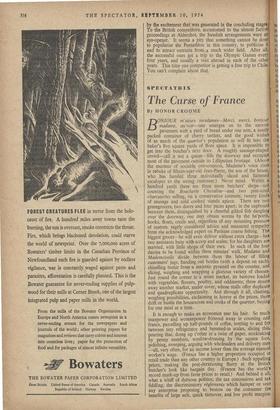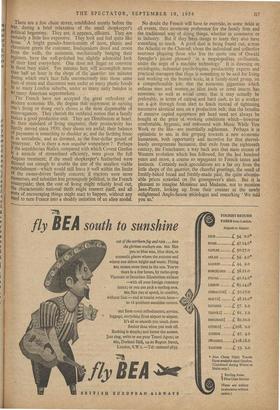SPECTATIIIX
The Curse of France
By HONOR CROOME BONJOUR m'sieurs mesdames—Merci, merci, bonjout madame, atevoir—one emerges on to the narrow pavement with a yard of bread under one arm, a neatly packed container of cherry tartlets, and the good wishes of as much of the quartier's population as will fit into the baker's five square yards of floor space. It is impossible to get into the butcher's next door. A roughly sausage-shaped crowd—call it not a queue—fills the doorway and occupies most of the pavement- outside its Lilliputian frontage. (Above the murmur of sociable conversation, Madame's voice rises in rebuke of fifteen-year-old Jean-Pierre, the son of the house, who has handed three individually sliced and flattened escalopes to the wrong customer.) Never mind. Within a hundred yards there are three more butchers' shops—not counting the Boucherie Chevaline—and two pint-sized charcuteries selling, on a conservative estimate, twenty kinds of sausage and cold cooked viands apiece. There are two greengrocers, two doors and four paces apart; in the cupboard between them, distinguished by a cheerful gilded fish dangling over the doorway, one may obtain worms by the ha'porth, hooks, floats, creels and, regardless of any mounting pressure of custom, sagely considered advice and measured sympathy from the acknowledged expert on Parisian coarse fishing. The biggest grocer—he will even deliver without extra charge—has two assistants busy with scoop and scales; for his daughters are married, with little shops of their own. In each of the four dairies to be found within three minutes' walk, Madame and Mademoiselle divide between them the labour of filling customers' jugs, handing out bottles (with a deposit on each)1 chiselling butter from a majestic pyramid on the counter, and slicing, weighing and wrapping a glorious variety of cheeses. Just round the corner is a street market, its barrows loaded with vegetables, flowers, poultry, and oddments; three streets away another market, under cover, whose stalls offer duplicate and quadruplicate opportunity. And through it all, chatting, weighing possibilities, exclaiming in horror at the prices, there drift or buskle the housewives and cooks of the quartier, buying for one meal at a time.
It is enough, to make an economist tear his hair. So much manpower and womanpower frittered away in counting odd francs, parcelling up half-pounds of coffee, trotting to and fro between tiny refrigerator and hemmed-in scales, slicing this, pouring that, doing up t'other in' a twist of paper, stocktaking by penny numbers, window-dressing by the square foot. polishing, sweeping, arguing with wholesalers and delivery men —all, very often, for an income lower than the average manual worker's wage. (France has a higher proportion occupied iti retail trade than any other country in Europe.) -Such appalling prices, making the post-derationing flurry at the British butcher's look like bargain day. (France has the world's record mark-up from farm prices to retail.) And behind it all, what a whiff of dubious politics; the tax concessions and tax fiddling; the discriminatory regiments which hamper or veto any enterprise proposing to bestow on the consumer the benefits of large sale, quick turnover, and low profit margins. There are a few chain stores, established mostly before the War, during a brief relaxation of the small shopkeeper's Political hegemony. They are, it appears, efficient. They are evtainly a little less expensive. They look and feel quite like home. A bright pseudo-Americanism of neon, plastic and Chromium greets the customer, lbudspeakers drool and croon from the walls, the assistants, mechanically banging their registers, have the well-polished but slightly adenoidal look Of their kind everywhere. One does not linger or converse in these busy aislese. Ten minutes here will accomplish more than half an hour in the shops of the quartier; ten minutes during which one's face falls unconsciously into those same lines of strain and discontent seen under so many plastic hoods in so many London suburbs, under so many natty hairdos in so many American supermarkets. . . . The French have not accepted the great orthodoxy of modern economic life, the dogma that enjoyment in earning one's living or doing one's chores is the most dispensable of extravagances. They cherish the outdated notion that a family makes a good productive unit. They are Distributists at heart. So their standard of living stagnates; their productivity has hardly moved since 1930; their slums are awful; their balance °f payments is something to shudder at; and the farthing franc IS as unrealistic, and as doomed, as the four-dollar pound of Yesteryear. Or is there a non sequitur somewhere ? Perhaps if the antediluvian Hanes, compared with which Covent Garden is a miracle of streamlined efficiency, were given the full A ugean treatment; if the small shopkeeper's featherbed were thinned out enough to double the size of the smallest viable establishment—which would still leave it well within the limits Of the owner-driven family concern; if tractors were more numerous, and subsidies less grotesquely political, in the French Countryside; then the cost of living might reliably level out, the characteristic national thrift might reassert itself, and all sorts of encouraging things might start to happen, without any need to turn France into a shoddy imitation of an alien model. No doubt the French will have to override, in some fields at all events, their inveterate preference for the family firm and the traditional way of doing things, whether in commerce or in industry. But if they have things to learn they also have something to teach. A good deal is being found out, across the Atlantic or the Channel, about the individual and collective neuroses plaguing those who live (to quote one of Oswald Spengler's juicier phrases) 'in a megalopolitan civilisation, under the aegis of a machine technology.' ft is dawning on sociologists, industrial psychdlogists, productivity experts and practical managers that there is something to be said for living and working on the human scale, in a family-sized group, on a comprehensible job; that the economic gigantism which reduces men and women to idiot tools or coral insects has economic as well as social costs; that it may actually be preferable, in terms of output and hard cash, to let a worker see a .job through from start to finish instead of tightening successive identical nuts on a production belt; that the benefits of massive capital equipment per head need not always be bought at the price of working conditions which—however comfortable, hygienic, and enlivened with Music While You Work or the like—are essentially subhuman. Perhaps it is optimistic to see, in this groping towards a new economic humanism, both opportunity and incentive for that marvel- lously unregenerate humanist, that exile from the eighteenth century, the Frenchman; a way back into that main stream of Western evolution which has followed, for the last hundred years and more, a course so repugnant to French tastes and instincts. Certainly such speculations are a far cry from the little shops of the quartier, the cheerful greetings, the smell of freshly-baked bread and freshly-made pâté, the quite abomin- 'able prices scrawled on the greengrocer's slate. But it is pleasant to imagine Monsieur and Madame, not to mention Jean-Pierre, looking up from their counter at the newly enlightened Anglo-Saxon sociologist and remarking 'We told you so.'



































 Previous page
Previous page